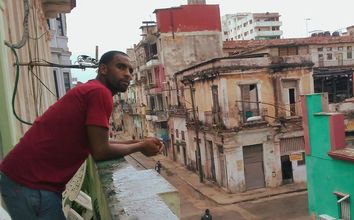 Jordan on a recent trip to Cuba Jordan on a recent trip to Cuba Name: Jordan Brown Current Age: 31 Age when you traveled: 21 Location: Bermuda What were the circumstances of this trip? My grandfather was stationed in Bermuda during the late 1960s with my grandma, mom and my two uncles. In the Air Force, he sang in a band to stay creative. We found out that we had additional family down there so we decided to visit. What impact do you feel this trip had on you? Visiting Bermuda was the first time I travelled with family. Since I was 6, I only travelled alone to visit my dad in Washington D.C. Now I was in Bermuda with my mom and cousin. Another aspect about Bermuda was that it was predominantly Black and people spoke with English accents. This was all new to me since growing up in Sacramento and being a part of small black student population. It was a lush island with history and culture. Do you feel this trip affected your sense of self or the world? If so, in what way? When I was in Bermuda, the Black folks there were different from those I have experienced in the Sacramento, CA. When walking down the street and seeing another Black person, the common thing to do in Bermuda is to say hi or smile. This acknowledgement wasn’t as common where I was from. I mean sometimes older Black men would say hi to me and I thought "do I know them." But after traveling to Bermuda I saw the importance of valuing our presence. Mainstream society has done little to recognize us as divers and unique people. Black people deal with many challenges related to family, racism, employment, etc., To have someone who looks like you say "what's up" or a simple smile and nod feels good when. Now that I experienced it, I have gotten into the habit of acknowledging other Black folks when walking by instead of looking down or at my phone. ...after traveling to Bermuda I saw the importance of valuing our presence. 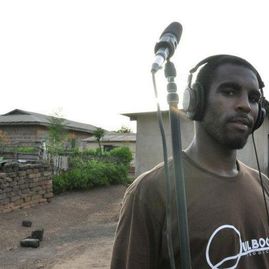 What do you think you accomplished or pursued that you otherwise would not have? I think seeing Bermuda gave me the travel bug. I had a great time and wanted to see where else I could go. Being exposed to a new culture caught my interest to where I was growing old of Sacramento, the people and the college I attended. Traveling to Bermuda showed me that it is possible to save your own money, apply for a passport, get a ticket, and go. What do you feel contributed the most to this effect? What contributed to this effect was seeing the people in Bermuda and traveling to Europe where less people looked like me. So when I saw a Black person I immediately smile and sometimes they'd do the same. When traveling to Africa(Ghana, Morocco) or Columbia, I experienced this ten fold. It promoted the beauty of blackness that we have been taught to hate. So when I got back to California, I wanted to keep this in practice because it lets others know they are valued. Like, “I see you when the rest of the world doesn't.” What advice would you give to the person you were before you took this journey? The advice I would give to myself to learn from people. Look at black travel bloggers. Have conversations with new people. Document more of your time through writing and photography via social media. Be humble and flexible with your comfort zone. 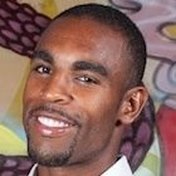 Biography Jordan runs culturecontech.com a consulting company for educators, students, and parents to receive culturally relevant educational. works with students, parents, colleagues, and administration to implement culturally relevant technology in the classroom to address the needs of diverse students. As a graduate of the University of San Francisco's Digital Technology for Teaching and Learning Master's program, Jordan has created curriculum, facilitated trainings, and conducted research to develop a deeper understanding of technology, culture and learning to serve underrepresented youth. Traveling the world influences his passions to connect culture to learning. Jordan has used his media skills and culture awareness to impact communities in El Salvador, Germany, and Ghana. 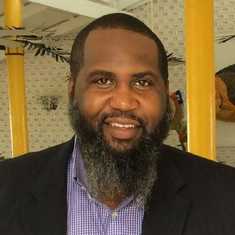 Henry Hughie was 36 when he first traveled to Abidjan, Cote D'Ivoire. With minimal travel plans and an intense desire to travel to the African continent, Henry describes embarking on a journey that would shift his perspective on the world, Africa, and himself. What were the circumstances of this trip? I was curious about the continent of Africa. I did some research and was able to find parallels between my culture here in the states and of those in West African countries. I grew up on the coast of South Carolina and we are known as “gullah” people. As a result, I wanted to delve deeper into the origin of this culture. I started studying the french language in order to easily communicate and move about freely. It wasn't necessarily the language that I wanted to learn at the time, but a language spoken in many West African countries, because of colonialism. I then bought a ticket and visited a travel clinic to inquire about the shots that I needed. I remember landing in Belgium and thinking to myself..."I will be in Africa shortly.” It was the most intense feeling that I've ever experienced. I also experienced fear because I didn't know what to expect. I didn't have an itinerary and was a free spirit, living a dream! I've always felt a connection to the continent, but I wasn't sure where to start. After talking to a few people and doing some research, I took the trip of a lifetime. What impact do you feel this trip had on you? I have more of an appreciation for who we are as a people. I was able to see first-hand the nature of who we are. We are a community people and I try to put that on display every opportunity that I have. This trip allowed me to see beyond what I saw on television as a youth. Africa is beautiful and she is resourceful! Do you feel this trip affected your sense of self or the world? I feel more empowered and I feel more connected than ever before to West Africa. I truly have a better understanding of how vast and diverse the world is. After my trip to Cote D'Ivoire, I have been to several other countries and this has allowed me to eliminate the word "minority" from my vocabulary. I have seen some of the most beautiful black people everywhere that I've visited. There is no continent that you can visit and not see in some form or another the contributions of the African. I'm very proud of that! 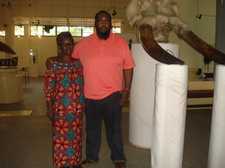 Henry visiting a museum in Abidjan. Henry visiting a museum in Abidjan. What do you think you accomplished or pursued that you otherwise would not have? I made life-long friendships when I was in Abidjan and those friendships turned into partnerships in other places around the globe. If I would have remained content with the way life was for me at the time, things would have remained the same. What do you feel contributed the most to this effect? I believe that because of my open mind, I was able to soak up the vibes around me and process everything using every part of my intellectual being. What advice would you give to the person you were before you took this journey? I would encourage myself to be prepared to unlearn all the things that I thought I knew about humanity. What, if anything, would you change about your experience? I wouldn't change anything. I traveled to a country blind and returned with a better understanding and the awareness of an elder. ---------------------------- About Henry: Henry Hughie is an IT Manager at Johnson C. Smith University where he also serves as an adjunct professor. He is a graduate of Savannah State University where he played football and earned a BS in Computer Science. He also holds an MBA with a concentration in Project Management. A certified life coach, published author, philanthropist, and motivational speaker, Henry uses much of his time empowering young people across the country and abroad. He's very passionate about utilizing his business skills and knowledge to impact public education, business and community development, and individual achievement. Henry has traveled to Europe, West Africa, and the East & West Caribbean Islands. Henry is currently managing a technology and cultural exchange project in the country of Togo located in West Africa and is a stakeholder for an Aquaponic garden project in Haiti. Do YOU have a travel story you'd like to tell?
Leaders of the Free World is looking for first time travel stories from African-American men. Contact us if you'd like to share your story. 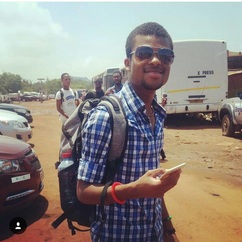 Over 10 months ago, I was told about a program that was investing time into the future of young black men through leadership and international experience. Being a Black male myself and in my first year at college I felt this was something I needed to do. At first I was discouraged, since the program was only looking young men residing in the Northeast, but I reminded myself, that attempting to apply wouldn’t hurt. Once I got accepted, I was determined to do my best to be a part of the program. I knew I would gain so much from traveling to Ghana and being forced to develop a new sense of awareness and coming to terms with my own self-identity and understanding who I am and wanted to be as a Black man in a country and professional field where I practically felt neglected. I felt that reclaiming and understanding one’s history is crucial in moving forward. Developing the ability push through road blacks in order to succeed is essential for anyone, especially for the Black man who is often told he is nothing. This was my first trip abroad. And I couldn’t have asked for a better group of people and experience to have shared it with. Apart of the program, we had conversations every night with our mentor/coach, Lavar Thomas. Our program focused on 10 different themes that focused on becoming the kind of people we wanted to be, when we returned to the states. These sessions were beneficial because it created a safe space for reflection, projecting fears, and setting goals. Developing the ability push through road blocks in order to succeed is essential for anyone, especially for the Black man who is often told he is nothing. 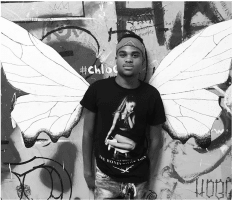 Apart of the trip, we visited several business and organizations within Accra. Two of the most inspirational places, for me, were the Human Rights Centre and a law firm. Walking into the Human Rights Center, I expected it to be a great experience, but the effect it had on me was incredible! Having the conversation with the HRC staff, and getting to hear their passion for equality for all human beings in Ghana was extremely inspiring! I related to it so much because it’s the work that I want to do as an Artivist (artist/activist). Alternatively when we visited the law firm, I saw a different side of things. While we listened to a lawyer express his own personal views about the LGBT community, I understood that while groups like HRC existed, there were also people who felt differently about members of the LGBT community in Ghana....even those who practiced the law. But this sparked a fire and a passion in me. Like HRC, I wanted to do more in the fight against inequality and Gay rights. These experiences, fused with the nightly conversations, and all the other great organizations we visited inspired me to come back to the U.S., and begin working on a dream of mine that I’ve been postponing until I graduated from college. After taking this journey with LFW, I learned so much about myself, goal setting, achieving success, creating a support system, and so many other things that it was time to begin work on creating my theatre company geared towards bridging gaps among racial, economical, and educational barriers by providing a space for innovative work, workshops, and educational programming to be voiced and discussed among audiences. In doing this work, my goal is to make it a global company and partner with organizations around the world like the Human Rights Centre to bring an awareness to the work these organizations do and create a sense of equality and justice for EVERYONE! I believe that without Leaders of the Free World. I would have never realized who I was and who I wanted to be and my purpose for a long time my participation in the program was truly a life changing experience. Shemar Wheeler, 18: Shemar Wheeler is currently studying acting at California Institute of the Arts. In high school Shemar was the House Manager for various school productions and events. 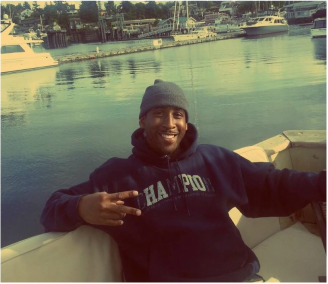 Joseph "Joey" Peele, was 16 when he had his first international experience. As Joey describes, this experience changed the way he saw and connected to those around him and instilled in him a deep appreciation for travel and other cultures. Current Age: 33 Age at the time of travel: 16 Where did you go? A cruise to The Bahamas Why was this trip meaningful to you? Growing up, my parents never took our family on a vacation together. My father became disabled when I was six years old. Over the next 10 years his condition worsened each year. When my father fell terminally ill, he told my mother that his only regret was that we never took a family vacation. My father passed in May 2000, just a couple of months after we uprooted him from his life-long home in Washington, NC to follow my mother's upward career move to better support our family. After my father's passing, she huddled my brother and I together, and decided that the first thing we would do as a family would be to take our first family vacation to honor my father. That November, we flew into Miami (my first flight ever!) to board our first Carnival cruise to The Bahamas. At the time, flying was perhaps my biggest fear, so in order to be with the family, I had to conquer my biggest fear. I know my father would have wanted me to be brave. He fought in Vietnam and is considered a war hero by his fellow soldiers, so to me, I had large expectations to fill. I know the Bahamas isn't a major international trip, but for me and my family, it was a huge turning point in our lives. What impact do you feel this trip had on you? This trip was full of so many firsts for me (flying, learning about a passport, family vacay, and many more). This trip also came right on the heels of moving to a new town and a new high school midway through my junior year, and losing my father 6 months later, then transferring to my 3rd high school for my senior year. My life was at a crossroads and life could have gone in any number of ways and I’m thankful that I had someone in my corner that knew there was a world so much bigger than myself outside of North Carolina as I was witnessing first-hand just how fragile, precious, and short, life really is. Subconsciously, this trip was slowly shifting how I value human relationships. 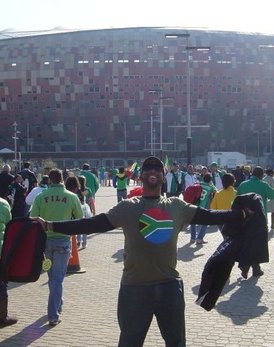 How do you think this trip effected your sense of self or the world? The exposure I got from this trip really changed my perception of people, culture, how other people viewed me, but yet how small my life actually was in comparison to the whole world. Geographically, I had no idea where the Bahamas even was on the map. At the time of this trip, I was a high school athlete with a handsome smile. I often felt as if the world revolved around me and everyone else was just a movie extra in my blockbuster. Whew, boy, was I wrong! Subconsciously, this trip was slowly shifting how I value human relationships. I became fascinated with other cultures, while developing an extraordinary passion to just explore more of the world. It seemed as if we had fell into a whole new dimension, and a whole new way of life, where I was no longer the main character. No one knew who me, my mother, or my brother were, nor did they care. I learned that people are people everywhere you go, and how you treat people will often dictate how you are treated. It also showed me how meeting and making deep connections with people through your travels can unlock so many keys to new doors you never knew were right in front of you. Everyone comes from somewhere different, everyone has a unique story, all cultures have a history. Once you allow yourself to open your mind, be courageous, and challenge your status quo, you will find benefits for your life and your work. This could even mean be by travelling outside of your city and striking up a conversation with someone you've never met before. Some of the people we met on that very cruise are still friends of our family to this day. 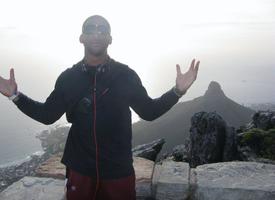 What other trips have you taken? Now, I can say that I have been on three trips to France, Germany, Austria, Switzerland, The Netherlands, Spain, Belgium, Canada three times, South Africa twice, Mexico, and The United Arab Emirates. As I have gotten older, I strongly feel that going outside of the major cities gives you a more authentic feel and a more palatable taste of a country's flavor than that of the inner cities. What advice would you give to the person you were before you took this journey? Dream your biggest. Be your greatest. I would also encourage myself to be present in every experience and opportunity. Being present can change your life, and it's incredibly simple. Learn it, practice it, be it. What, if anything, would you change about your experience? The thing I would change about my first few experiences would be to invent camera phones! I would have loved to save and cherish more of those memories from my first experiences. I am sure there are many a stories that have since faded from my memory that I desperately wish I could have back. Now I utilize my cell phone camera and dSLR camera to photo journal and video each journey to make sure I don't lose the lessons I've learned or the friends I've made along the way. About Joey: Joey is a native son of North Carolina (Beaufort and Halifax Counties respectively). Joey holds a B.S. degree in Journalism & Mass Communications with a concentration in Public Relations from North Carolina A&T State University. Upon graduation, Joey worked at the NC General Assembly and with the US Senate before working the with the North Carolina Public Health Foundation as the Rockingham County Catalyst for Healthy Eating and Active Living. Joey's passions are giving public service, and world travel. Leaders of the Free World is very proud to announce our new Co-Director, Lavar Thomas!! 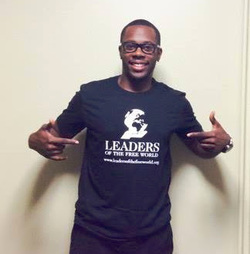 As many of you know, Lavar has been an amazing asset to the LFW program and played an integral part in our inaugural trip to Ghana this past summer. Lavar’s leadership experience and expertise in international experiential learning, lent so much to the LFW program. As a recent Peace Corps Health Volunteer and a Kaplan Leadership Scholar, Lavar’s passion for service leadership,personal development, and international experience drive his commitment to helping others cultivate their own personal power. As Co-Director Lavar will continue to oversee the leadership development and mentoring curriculum of the LFW program as well as assisting in the recruitment of new fellows and mentors and working with our organizational partners. 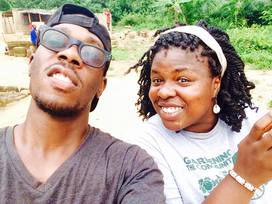 Additionally, Lavar will be kicking off, his own passion project, “Empower for Greatness” (EFG) a movement to help youth, entrepreneurs, and young professionals lead with authenticity and confidence. As Lavar notes, “I am committed to helping individuals overcome self-defeating thoughts. Travel has played a significant role in my professional and personal growth. By providing the young men of LFW the opportunity to step out of their comfort zones and get a glimpse of the world, I believe it will cultivate a renewed sense of self.” Planning for the 2018, Leaders of the Free World cohort is already underway. This next trip will bring together fellows and mentors from all over the country. These fellows will grow together, learn from each other and support each other through this new experience. This group will be comprised of individuals passionate about service, self-mastery, and building a bigger brighter future for their communities. 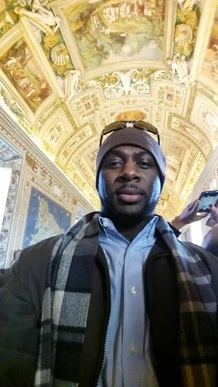 In 2005, I had the chance to study abroad in London, UK. It was significant to me for a few reasons. I had never traveled abroad and this trip was the impetus for me actually getting a passport. Also this experience was transformative because it was during this trip, while studying British Politics, the EU, and economics, that I decided to change my major in school to political science so that I could pursue my passion and interest in civics, engagement, policy, and political systems. The trip will always be memorable to me, because my first trip abroad would also be influenced by the growing threat of terrorism. While I was in class on July 7, 2005, four bombs would explode across London on the trains and buses during rush hour, including at the train station and bus route closest to where I lived for the summer. Witnessing the fear and tragedy that accompanied that experience really clarified for me how policies and political decisions affect our lives and our security in really consequential ways. It was an event that heightened my interest in pursuing policy and my desire to only work on things that I felt would truly make a difference in our world. About Corey: Cory works in work in Silicon Valley in product optimization with the user's experience at the forefront of his work. Corey is also the founder and a blogger for Collected Young Minds, a site dedicated to giving a voice to millennials to think, discuss, and engage on issues that matter to them. Corey has been blogging for over five years, mostly inspired to write about politics, activism, and civic engagement, which gave birth to the idea for CYM. Twitter: @spktruth2pwr; Facebook: ctponder; Instagram: @spktruth2pwr 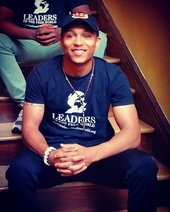 By: Karl Golden, LFW Fellow Just about a month ago I came back from a life changing trip. When I first came back, everything pretty much felt the same. But as the days went on the changes started to sink in. I knew that my life would never be the same as it was before. Don't get me wrong I loved my life before the trip but now my mindset, choices, and perspective have shifted and grown . Before the trip I was not to sure what to expect; so I decided to go into this opportunity with an open mind. Pre-departure I was feeling stagnant and complacent in my current lifestyle. Everything was in order and going smoothly but nothing was really changing. I wanted to improve my life. Do you ever feel like your living life day to day with no bigger purpose? That's how I was feeling. I made the choice to step out of my comfort zone and leave the United States. 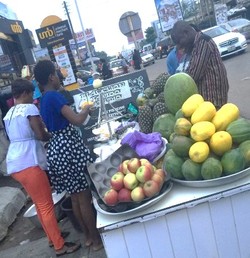 Fruit Vendors on the streets of Osu in Accra Fruit Vendors on the streets of Osu in Accra Going into Ghana, Africa I didn't know what to expect. After getting off the plane, I was in a state of relief that I finally made it. I thought to myself "Wow this is really what it's like". I see people waiting outside the airport, billboards everywhere, and heavy traffic. I was in the middle Ghana's capital city. We split into 2 cars and head towards the hotel. As we drive down the street we see shops, vendors, and people everywhere. We get to the hotel and settle in our rooms. The first eye opening experience was walking into a main part of town. As we are walking around town people start to approach us and strike up conversations. I talk with a few of the locals and get to know them a little better. They are extremely friendly and helpful. Each person brought different items to offer us. Some were selling paintings, bracelets, and sunglasses, others were selling food and drinks. One saying I specifically remember that was painted on the canvases was '"No food for lazy man". This saying really stuck with me and I even think of it now that I am back in the States. I could tell this saying was instilled in all of the locals because each person was an entrepreneur in their own way. 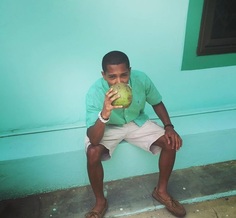 Eating fresh coconut Eating fresh coconut As a growing and developing entrepreneur myself I felt right at home and could relate to the people. It was hard not to support them, each of the people were looking to earn a living working for themselves. It wasn't by choice though, they had to survive. It gave me even more motivation. If I want to be a successful entrepreneur I have to change my perspective, I must work for myself to survive and not fall back on a 9-5 job to pay my bills and living expenses. When realizing this I felt a wave of relief come over me. I finally understood what it is going to take for me to truly become successful. I must hustle and grind like my survival depends on it. The experience of being in Ghana not only taught me this but showed it to me. Look out for two more articles on more of my experiences in Ghana, Africa coming very soon! Also check out TheNewMovement.net for pictures and other inspiring articles! 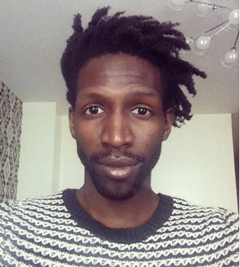 At Leaders of the Free World we are passionate about the transformative power of international travel. To that end, we are highlighting the stories of several young, Black men whose international experience had lasting impact on their lives. In some cases, these experiences spurred them to make a difference in their communities. Bashir Harrell, now 29, traveled to Japan at age 21. A trip meant to be just a few months expanded into a year: “I was selected for a semester study abroad program at Kansai Gaikokugo Daigaku (Kansai Gaidai University). After my first semester, I enjoyed the program so much I made a request to the dean to extend my stay.” “The people I met during my first time abroad were not just from Japan, but from all over the world. Many of them were there to study the language, but some had moved there long ago. I believe that meeting all these people that traveled for many different reasons from many different places essentially opened my eyes to the differences and most importantly the similarities in people of all race, creeds, and cultures.” While in Japan, Bashir was able to develop his linguistic skills. He believed his trip played a key role in this. “I truly believe that traveling to Japan was a pivotal point in my life. My time in Japan, first as a student and then as a teacher amplified my love of languages. I am happy to say that I am now proficient in Japanese, I am currently learning Mandarin, and occasionally play with French and Spanish. These are all things that I do not think I would have done if I did not make that first step.” “This trip opened my eyes to the world outside of my hometown, schools, and university community. It was a transformational experience where I was able to look back at my life and reflect on where I had been and what I had been through, while simultaneously comparing the culture of Japan to the cultural upbringing that I had in the Unites States.”Bashir’s trip made him feel that he could travel anywhere he wanted to go. “Since my first trip to Japan I traveled back there 2 more times both for stays of over a year. My curiosity of world languages and cultures propelled my graduate studies of Applied Linguistics at Teachers College, Columbia University. I believe that experiencing another culture is one of the best lessons that one can have.” “The world is your classroom. Learn everything you can from anyone who is willing to teach you. Do not be afraid of trying new things, but know yourself and understand your limits. Be true to yourself and take in everything the world has to offer. Take many pictures and keep a journal. It doesn't matter what you write, just make sure that you do.” About Bashir: The son of African storytellers, Bashir Harrell is not your average South Carolinian. Born in Georgetown, SC the second of four children, his parents named him Bashir because it means “messenger of good news”. Bashir has spent his 29 years bringing just that to everyone he meets. His life goals has lead him from South Carolina to Florida, to Japan to New York City. Now as his journey to share “good news” with the world continues as he is making plans to land in Beijing, China. Working with the Peace Corps is a travel experience like no other. Lavar Thomas, age 25, is currently serving as a Community Health Volunteer in the Western Province of Rwanda, a stay that will last a total of 27 months. Here, Lavar discusses his experiences and the lessons he's taught and learned. 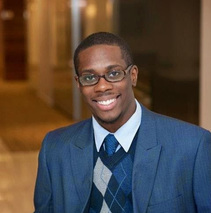 As a Peace Corps volunteer, I am confronted by children affected with malnutrition and families fighting against abysmal poverty conditions. At the local health center where I work, I attempt to address the issue of food security and malnutrition by helping to train mothers and households on creating their own kitchen garden to increase access to nutritious foods. In addition to this, I have also been able to apply my musical talent and passion, creating a song and performing it at my swearing-in ceremony, as well as utilizing my musical creativity to teach effective hygiene practices and leadership empowerment among local youth. As a health volunteer, I am tasked with weighing babies and identifying sustainable ways to address health and social issues that affect people within my village. On my commute to my health center, I encounter children who are either severely malnourished or with visibly bloated stomachs due to limited access to a consistent meal. This experience has not only been a learning experience or channel to make a difference, but also an opportunity to appreciate what I often took for granted living in the United States and living in NYC. Furthermore, as one of only two black American male volunteers currently serving in Rwanda, I recognize the need for more young men of color to have international exposure. For many people within my village, I am the first black American they have encountered. In many of my youth workshops, many of my students become confused when I speak English and present myself differently than what they see in American music videos. My presence counteracts Rwandan assumptions about what is 'American'. The perception regarding black American culture is frequently shaped by media as a result of the lack of travel by black Americans. My presence counteracts Rwandan assumptions about what is 'American'. The perception regarding black American culture is frequently shaped by media as a result of the lack of travel by black Americans. 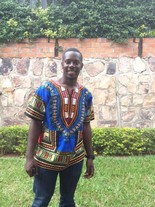 Living in Rwanda the past two years, I have recognized that for individuals living in more remote areas, to be an American means to be 'white'... the majority of the Americans they encounter, who are either doing development work or volunteering, are white. So as a black American, my very existence and visibility challenges their belief system as to what an American looks like or what it even means to be an American. Since I look like those in my environment, there is also an expectation to have greater fluency in the local language compared to my colleagues, however I find that Rwandans are more likely to feel comfortable opening up at a personal level, which is not common especially as a post conflict country. As I come to the end of my service in Rwanda, my experience as a Peace Corps volunteer has not only challenged my worldview and sense of self awareness, but also led to a greater appreciation for the relationships and for the lives that I come in contact with. The things that I took for granted such as brushing my teeth with clean water, using a toilet, or having electricity are things people in my village live without. Overall, being a part of this environment has helped me to identify what's really important in my life and lead a life of gratitude and purpose. About Lavar: Lavar is currently finishing up his 2yr Peace Corp term in Rwanda as a Community Health Volunteer. He received his B.A. in Political Science from Clark University, and is the former legislative aide to the chairman of the Public Health Committee and to the State Representative of the 15th Suffolk district in Massachusetts. (Story compiled by Elizabeth Meravi) 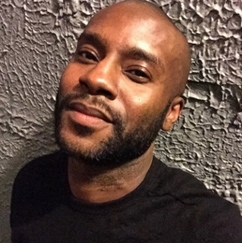 By: Philip Richardson I was 32 years-old when I took my first trip outside of the United States. I boarded an evening flight from John F. Kennedy airport — on the Indian airliner Jet Airways — which landed in Brussels the next morning, where to my surprise, signage and announcements were all made in French, Dutch, and eventually, English. Here was the Europe I had spent an entire academic life reading about. As a teenager I was self-proclaimed history-buff who enrolled in A.P. history courses well beyond the requirements needed for my high school diploma. To put it another way, I was in nerd heaven. From Brussels, I made a connection that landed in Milan, to spend two weeks with an architectural historian I befriended while doing laundry in South Brooklyn. His apartment in Bruzzano, a neighborhood in the northeast of Milan, was once a fifteenth century castle that was now converted into several apartment units. From there I purchased economy airfare to Sicily, visiting Palermo, and heading to Venice via train. My eyes were opened to the Old World when I stepped foot onto Italian soil. History permeated the Roman columns and aqueducts of Milan, the Norman castles of Palermo and the Piazza San Marco of Venice. I had stepped out of the pages of my history books, onto the very soil that cradled the feet of Julius Caesar, Napoleon Bonaparte, and Silvio Berlusconi. "It was my first personal experience with the double consciousness about which W. E. B. DuBois wrote, and so many African-American travelers speak of. I stepped into a forgetfulness that allowed me to be something more than just my race." A lot of what I experienced was familiar. Getting around Milan was easy thanks to its buses, light rail, and subway system. The very same things I use to get around in New York, Chicago or San Francisco. I ate finger food from street vendors while strolling through parks. I went to art galleries, ran into fashionistas, witnessed random quarrels between lovers, and even had breakfast at McDonald’s (although they don’t serve egg McMuffins).
For the first time in my life began to feel like a citizen of a whole world. The Italians I met were intrigued by my Americanness, and my Blackness. They were not afraid of me. My humanity was never questioned. I learned to let my guard down and truly be seen. It was my first personal experience with the double consciousness about which W. E. B. DuBois wrote, and so many African-American travelers speak of. I stepped into a forgetfulness that allowed me to be something more than just my race. It was a moment, perhaps the first, when I walked the Earth not as a black man. At least not in the vilified and adversarial ways its experienced in the United States. It’s a strange moment when you finally experience a comfort around total strangers who see you in similar ways as you see yourself. Philip is a freelance journalist, photographer and news assistant for The New York Times. He was born in Los Angeles and grew up in Dallas, Texas. A graduate of The University of Texas at Austin with a bachelor of arts degree in Africana Studies, he is currently living in New York City and is an M.A. candidate at the City University of New York, Graduate School of Journalism. |
Archives
July 2020
Categories
All
|
 RSS Feed
RSS Feed